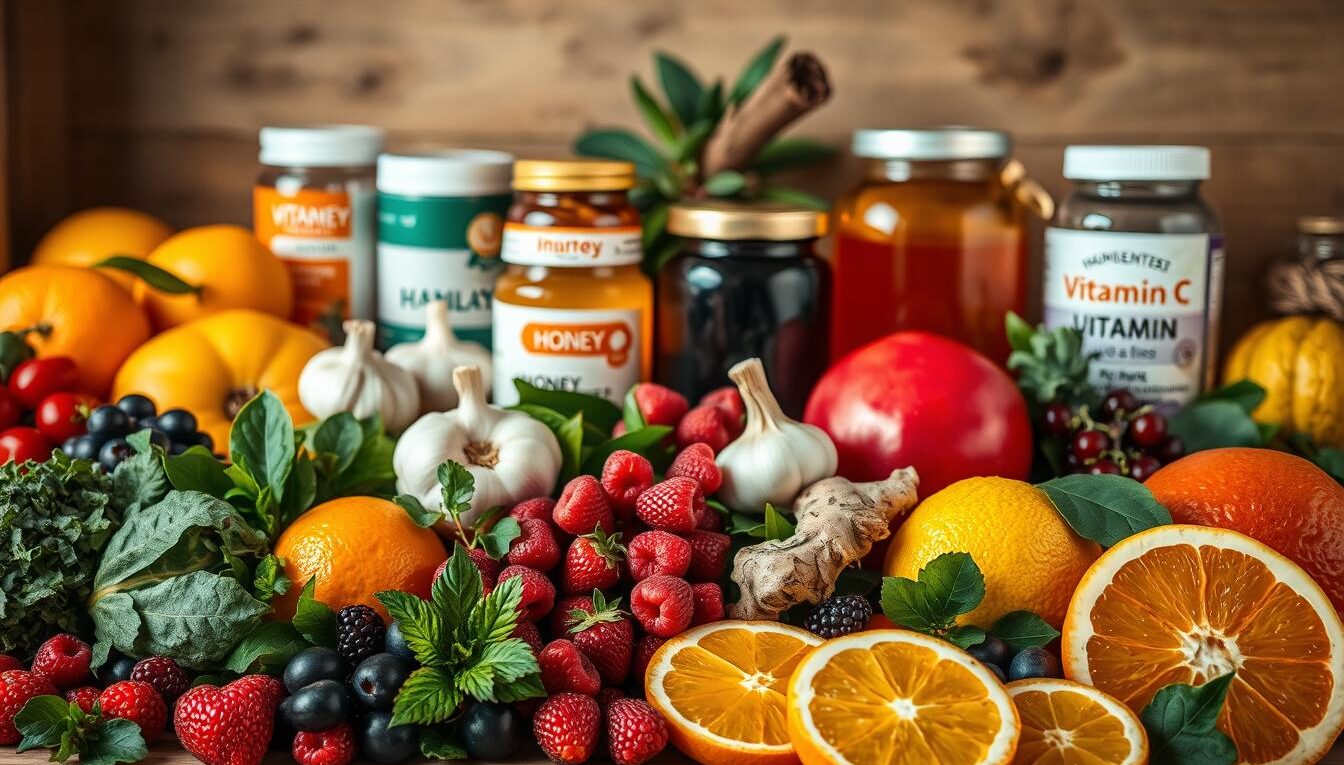Top Foods to Naturally Strengthen Your Immune System
A strong immune system is your body’s best defense against illnesses. With the right healthy eating habits, you can boost your immune function and stay healthy. Incorporating immune system boosters into your diet can make a significant difference.
Eating the right foods can help your body natural detox and support overall health. By focusing on nutrient-rich foods, you can give your immune system the support it needs to function optimally.
Key Takeaways
- Boost your immune system with the right foods
- Incorporate nutrient-rich foods into your diet
- Support your body’s natural detox processes
- Focus on healthy eating habits
- Enhance your overall health with immune system boosters
Understanding Your Immune System and How Food Impacts It
Your immune system is a complex network of cells, tissues, and organs that work together to defend your body against harmful invaders. Understanding how it functions and the role nutrition plays in its operation can help you make informed choices about your diet to support immune health.
The Basic Functions of Your Immune System
The immune system’s primary function is to protect you from pathogens, such as bacteria, viruses, and other foreign substances. It does this through a multi-layered defense mechanism, involving physical barriers like the skin, as well as cellular and chemical responses. A healthy immune system is essential for preventing infections and diseases.
The immune system’s function can be influenced by various factors, including genetics, lifestyle, and nutrition. Ensuring your immune system is functioning properly is vital for overall health.
How Nutrition Affects Immune Response
Nutrition plays a critical role in supporting immune function. A diet rich in essential vitamins and minerals can help boost your immune system, while a diet lacking in these nutrients can impair immune response. Foods high in antioxidants, such as fruits and vegetables, can help protect your cells from damage caused by free radicals.
| Nutrient | Role in Immune Function | Food Sources |
|---|---|---|
| Vitamin C | Boosts immune response, antioxidant properties | Citrus fruits, strawberries, bell peppers |
| Zinc | Supports immune cell function, wound healing | Oysters, beef, chicken, fortified cereals |
Key Nutrients That Support Immune Function
Your immune system’s effectiveness is directly linked to the nutrients you provide it. A diet rich in essential vitamins, minerals, and antioxidants is crucial for maintaining a healthy immune response.
Essential Vitamins for Immunity
Vitamins play a significant role in supporting immune function. The key vitamins include:
- Vitamin C: Important for the production of white blood cells.
- Vitamin D: Crucial for immune system regulation.
- Vitamin A: Supports the health of the thymus, an essential immune organ.
- Vitamin E: Acts as an antioxidant, protecting cells from damage.
- B Complex: Involved in various immune processes.
Vitamin C, D, A, E, and B Complex
These vitamins work together to support immune function. For example, Vitamin C enhances the production of white blood cells, while Vitamin D helps regulate immune responses.
How These Vitamins Work Together
The synergy between these vitamins is vital. For instance, Vitamins C and E work together to protect cells from oxidative stress, enhancing overall immune defense.
Minerals That Boost Your Defenses
Minerals are equally important for immune function. Key minerals include:
- Zinc: Essential for the development and function of immune cells.
- Selenium: Acts as an antioxidant, protecting cells from damage.
- Iron: Vital for the production of hemoglobin, which carries oxygen to cells.
Zinc, Selenium, and Iron
These minerals are crucial for various aspects of immune function, from cell development to protection against oxidative stress.
Proper Mineral Balance
Maintaining a balance of these minerals is essential, as deficiencies can impair immune function.
Antioxidants and Their Protective Role
Antioxidants, including vitamins and minerals, protect your cells from damage caused by free radicals, thereby supporting immune health.

Vitamin C-Rich Foods to Incorporate Daily
Incorporating Vitamin C-rich foods into your diet is a simple yet effective way to boost your immune system. Vitamin C is crucial for the growth and repair of tissues throughout your body, making it an essential nutrient for overall health.
Citrus Fruits and Their Benefits
Citrus fruits are among the richest sources of Vitamin C. They not only provide a refreshing taste but also offer numerous health benefits.
Oranges, Lemons, and Grapefruits
Oranges, lemons, and grapefruits are popular citrus fruits that are high in Vitamin C. Oranges are great as a snack or in juice form, while lemons can be used in cooking and as a flavor enhancer. Grapefruits are known for their bitter taste and are often consumed as a half-fruit or in salads.
Best Ways to Consume Citrus
The best way to consume citrus fruits is fresh. You can eat them as is, squeeze them into juice, or use their zest in recipes. Here are some tips:
- Drink freshly squeezed orange juice in the morning for a Vitamin C boost.
- Add lemon juice to your water or tea for an extra dose of Vitamin C.
- Include grapefruit segments in your salads for a tangy twist.
Non-Citrus Sources of Vitamin C
If you’re not a fan of citrus fruits or want to vary your Vitamin C intake, there are plenty of other foods rich in this vitamin.
Bell Peppers, Strawberries, and Kiwi
Bell peppers, especially the red ones, are sweet and contain a high amount of Vitamin C. Strawberries are not only delicious but also packed with Vitamin C and antioxidants. Kiwi is another small but mighty fruit that’s rich in Vitamin C.
Preserving Vitamin C During Cooking
To maximize Vitamin C intake, it’s essential to cook these foods correctly. Here are some tips to preserve Vitamin C during cooking:
- Cook vegetables like bell peppers briefly to retain their Vitamin C content.
- Avoid overcooking or boiling fruits and vegetables, as Vitamin C is water-soluble and can be lost in the cooking water.
- Steam or stir-fry vegetables instead of boiling them.
Vitamin D Sources for Enhanced Immunity
Vitamin D is a vital nutrient for immune function, and incorporating its sources into your diet can be highly beneficial. A well-balanced intake of Vitamin D not only supports bone health but also plays a crucial role in enhancing your immunity.
Fatty Fish and Seafood Options
Fatty fish and seafood are among the richest sources of Vitamin D. Consuming these foods can significantly boost your Vitamin D levels.
Salmon, Mackerel, and Sardines
Salmon, mackerel, and sardines are excellent sources of Vitamin D. These fish are not only delicious but also packed with nutrients. Salmon, for instance, is a fatty fish that provides a substantial amount of Vitamin D per serving.
Recommended Serving Sizes
To reap the benefits, it’s essential to consume the right serving sizes. For fatty fish like salmon, a serving size of about 3 ounces or 85 grams is recommended. You can grill or bake these fish to retain their nutritional value.
Plant-Based Sources of Vitamin D
While animal sources are rich in Vitamin D, there are also plant-based options available. These include certain mushrooms and fortified foods, which can be great alternatives for those following a plant-based diet.
Mushrooms and Fortified Foods
Some mushrooms, like shiitake and portobello, are capable of producing Vitamin D when exposed to UV light. Additionally, many foods like cereals and plant-based milk are fortified with Vitamin D, making them excellent dietary additions.
Combining Food with Sunlight Exposure
While dietary sources are crucial, sunlight exposure also plays a significant role in Vitamin D production in the body. Spending time outdoors, especially during peak sun hours, can help boost your Vitamin D levels naturally.
| Food Source | Vitamin D Content | Recommended Serving Size |
|---|---|---|
| Salmon | High | 3 ounces (85g) |
| Mackerel | High | 3 ounces (85g) |
| Sardines | High | 3 ounces (85g) |
| Fortified Cereal | Variable | 1 cup |
| Shiitake Mushrooms | Variable | 1 cup |
Zinc-Containing Foods That Fight Infections
To boost your immune function, incorporating Zinc-rich foods into your diet is vital. Zinc plays a significant role in numerous aspects of immune response, helping to fight off infections and keep you healthy.
Animal-Based Zinc Sources
Animal-based sources are among the richest in Zinc. These include:
Oysters, Red Meat, and Poultry
Oysters are exceptionally high in Zinc, making them an excellent choice. Red meat and poultry are also good sources, providing a substantial amount of Zinc per serving.
Absorption Enhancers
Consuming Vitamin C along with Zinc-rich foods can enhance absorption. Foods high in Vitamin C, like citrus fruits, can be eaten alongside Zinc sources to maximize benefits.
Plant-Based Zinc Sources
For those following a plant-based diet, there are still plenty of options available:
Legumes, Seeds, and Nuts
Legumes, such as chickpeas and black beans, are good sources. Seeds like pumpkin and chia, and nuts including almonds and cashews, are also rich in Zinc.
Overcoming Phytate Barriers
Phytates in plant-based foods can inhibit Zinc absorption. Soaking, sprouting, or fermenting these foods can help reduce phytate levels, making Zinc more bioavailable.
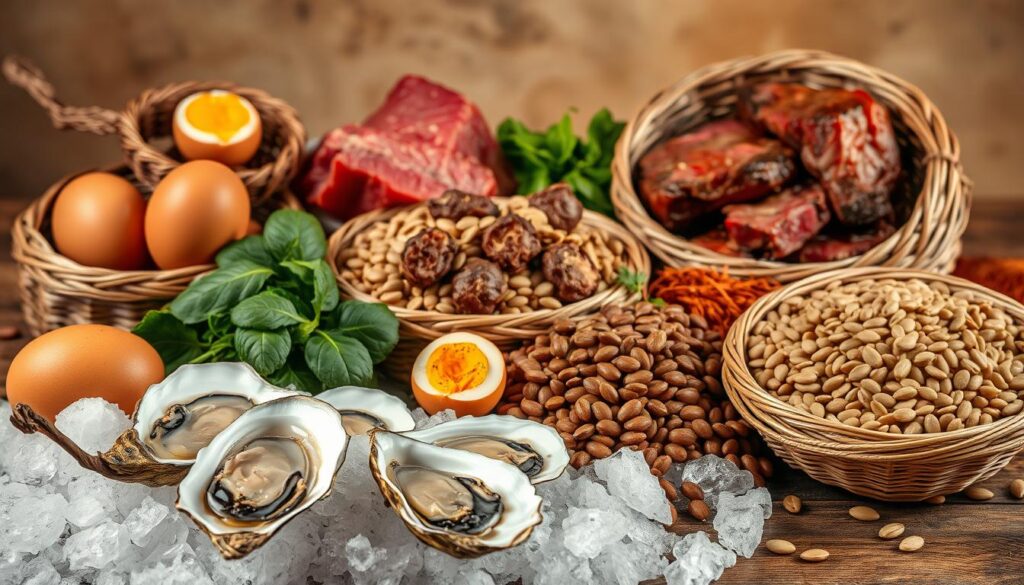
| Food Type | Zinc Content (mg per serving) |
|---|---|
| Oysters | 76.7 |
| Beef | 7.0 |
| Chickpeas | 1.3 |
| Pumpkin Seeds | 2.6 |
Top Foods That Strengthen Your Immune System Naturally
Nature has provided us with a variety of foods that can help strengthen our immune system naturally. Incorporating these foods into your diet can be a simple yet effective way to support your overall health.
Fermented Foods and Probiotics
Fermented foods are rich in probiotics, which play a crucial role in maintaining a healthy gut microbiome. A balanced gut microbiome is essential for a strong immune system.
Yogurt, Kefir, and Kimchi
Foods like yogurt, kefir, and kimchi are excellent sources of probiotics. They contain live cultures that help populate your gut with beneficial bacteria, supporting immune function.
Building a Healthy Gut Microbiome
In addition to consuming fermented foods, maintaining a diet rich in fiber can help support the growth of beneficial gut bacteria. This combination can significantly enhance your immune system’s effectiveness.
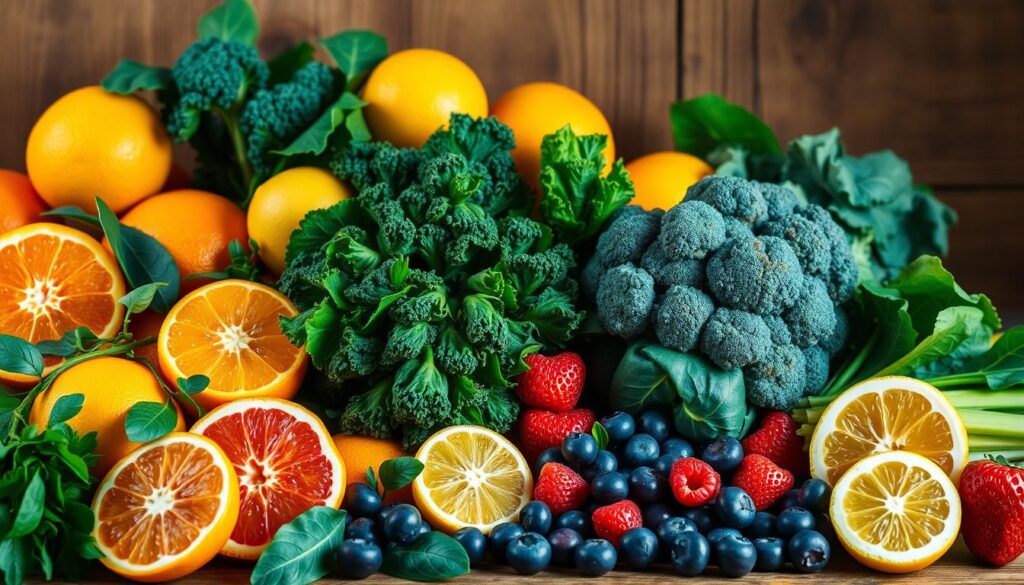
Garlic and Onions: Nature’s Antibiotics
Garlic and onions have been used for centuries for their medicinal properties, including their ability to boost the immune system. They contain compounds that have antimicrobial effects.
Allicin and Other Beneficial Compounds
Garlic contains allicin, a compound that has been shown to have antibacterial and antiviral properties. Onions also contain various compounds that support immune health.
Preparation Methods That Preserve Benefits
To maximize the immune-boosting effects of garlic and onions, it’s best to consume them raw or lightly cooked. Overcooking can destroy some of the beneficial compounds.
Colorful Fruits and Vegetables
Eating a variety of colorful fruits and vegetables is a great way to support your immune system. These foods are rich in vitamins, minerals, and antioxidants.
The Rainbow Diet Approach
The rainbow diet approach emphasizes consuming a wide range of colorful foods. This ensures that you’re getting a broad spectrum of nutrients that support immune function.
Berries, Leafy Greens, and Sweet Potatoes
Berries are rich in vitamin C and antioxidants, leafy greens are packed with vitamins and minerals, and sweet potatoes are a good source of vitamin A. All these foods contribute to a robust immune system.
By incorporating these immune-boosting foods into your diet, you can take a proactive approach to supporting your immune system. As “You are what you eat,” making informed choices about your diet can have a significant impact on your overall health.
Immune-Boosting Herbs and Spices
Boosting your immune system can be as simple as adding the right herbs and spices to your meals. Certain herbs and spices have been found to have immune-boosting properties, making them a great addition to your diet.
Turmeric and Ginger Benefits
Turmeric and ginger are two of the most well-known immune-boosting herbs. Turmeric contains curcumin, a compound with potent anti-inflammatory and antioxidant properties. Ginger, on the other hand, contains gingerol, which has been shown to have antimicrobial properties.
Curcumin and Gingerol Properties
Curcumin in turmeric has been shown to enhance immune function by supporting the production of antibodies. Gingerol in ginger has antimicrobial properties, helping to fight off infections.
Daily Usage Recommendations
You can incorporate turmeric and ginger into your daily diet by adding them to your meals. Try making a turmeric latte or adding ginger to your stir-fry. Aim for at least 1 teaspoon of turmeric and 1-inch piece of ginger per day.
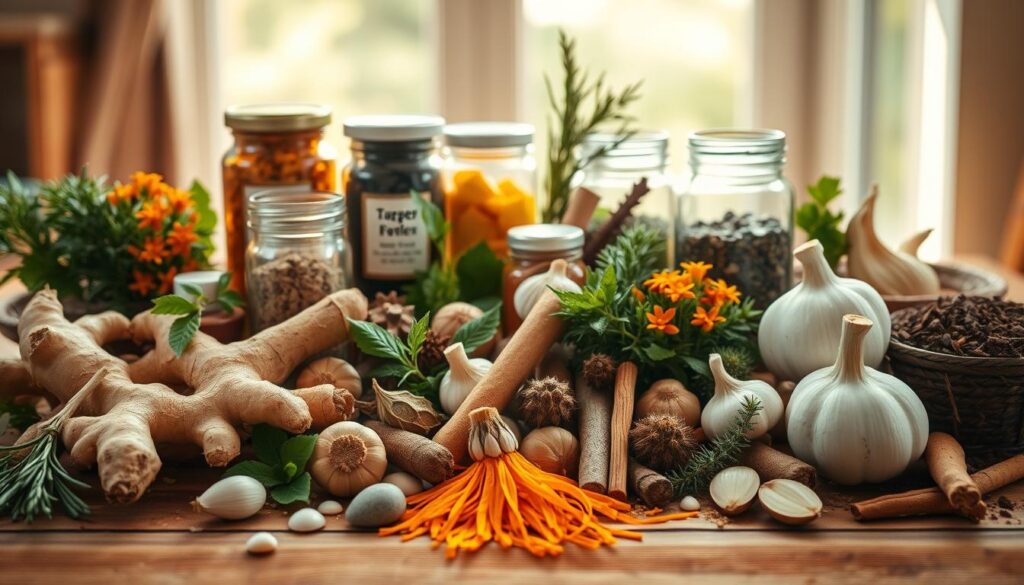
Other Powerful Spices for Immunity
Besides turmeric and ginger, other spices like cinnamon, cloves, and oregano have immune-boosting properties. Cinnamon has anti-inflammatory properties, while cloves contain eugenol, which has antimicrobial properties. Oregano is rich in antioxidants and has been shown to have antimicrobial effects.
Cinnamon, Cloves, and Oregano
These spices can be used in various dishes, from baked goods to savory meals. Adding them to your diet can help support your immune system.
Creating an Immune-Boosting Spice Blend
You can create your own immune-boosting spice blend by mixing together turmeric, ginger, cinnamon, cloves, and oregano. This blend can be added to your meals to give your immune system a boost.
Powerful Food Combinations for Synergistic Immune Support
By pairing specific foods, you can unlock their full potential to support immune health. Certain combinations can enhance the absorption of nutrients and boost the overall effectiveness of your immune system.
Vitamin C and Iron Pairings
Pairing Vitamin C-rich foods with Iron-rich foods can significantly improve iron absorption, supporting immune function. Here are some beneficial combinations:
Spinach with Citrus Fruits
Enjoying spinach with a squeeze of fresh citrus fruit like orange or lemon enhances iron absorption.
Lentil and Tomato Combinations
Cooking lentils with tomatoes not only adds flavor but also boosts the iron absorption from lentils.
| Food Combination | Benefit |
|---|---|
| Spinach with Citrus Fruits | Enhanced Iron Absorption |
| Lentil and Tomato | Improved Iron Utilization |
Turmeric with Black Pepper
Combining turmeric with black pepper can significantly enhance the bioavailability of curcumin, a powerful compound in turmeric with potent anti-inflammatory properties.
Enhancing Curcumin Absorption
Black pepper contains piperine, which has been shown to increase curcumin absorption by up to 2,000%.
Golden Milk and Other Recipes
Try making golden milk by mixing turmeric with black pepper and milk (dairy or plant-based) for a delicious and immune-boosting drink.
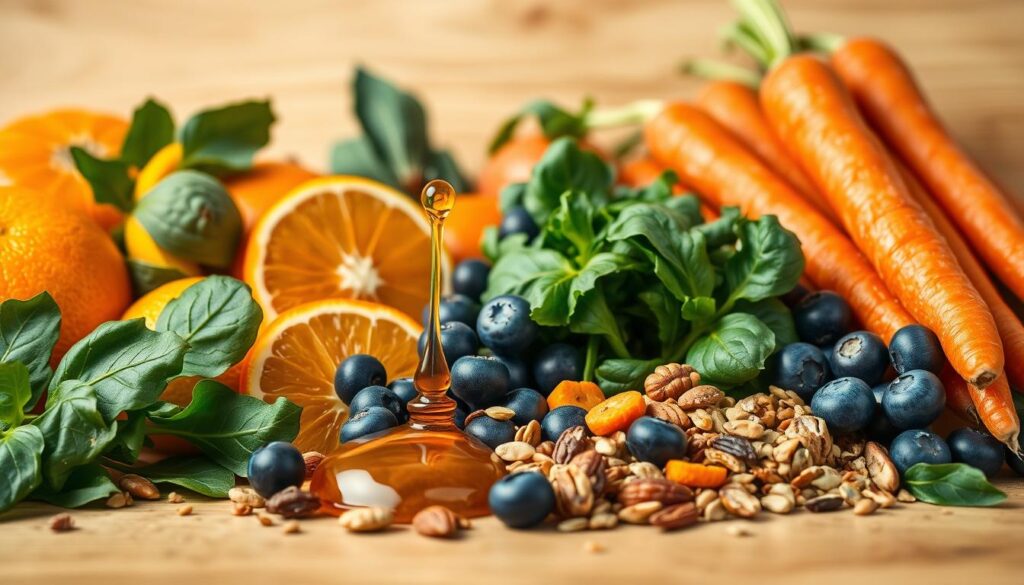
By incorporating these powerful food combinations into your diet, you can provide your immune system with the support it needs to function optimally.
Hydration and Immunity: Best Drinks for Your Immune System
Hydration plays a vital role in immune function, and incorporating immune-boosting drinks into your daily routine can be highly beneficial. Drinking enough fluids helps your body function properly, supporting the immune system’s natural defenses.
Herbal Teas with Immune Benefits
Herbal teas are a great way to stay hydrated while supporting your immune system. Certain teas have been shown to have immune-boosting properties.
Echinacea, Elderberry, and Green Tea
Echinacea is known for its potential to boost the immune system, while elderberry has been shown to have antiviral properties. Green tea, rich in antioxidants, can also support immune function.
Brewing Methods for Maximum Benefits
To get the most out of your herbal teas, it’s essential to brew them correctly. Use fresh, high-quality ingredients and follow the recommended brewing times to maximize their immune-boosting properties.
Fresh Juices and Smoothies
Fresh juices and smoothies can be a delicious way to support your immune system. They provide essential vitamins and minerals that can help boost your body’s natural defenses.
Immune-Boosting Juice Recipes
Try combining ingredients like orange, grapefruit, and ginger for a refreshing and immune-boosting juice. You can also add leafy greens like spinach or kale to your smoothies for an extra nutritional boost.
Balancing Fruit Sugars with Fiber
When making juices and smoothies, be mindful of the sugar content from fruits. Balancing fruit sugars with fiber-rich ingredients like vegetables or chia seeds can help mitigate any negative effects on blood sugar levels.
Foods to Limit for Better Immune Function
While incorporating immune-boosting foods is vital, it’s equally important to limit foods that can weaken your immune system. Consuming high amounts of certain substances can make you more susceptible to illnesses.
Sugar and Processed Foods Impact
Consuming high amounts of sugar and processed foods can significantly impair your immune function. Excessive sugar intake can suppress the immune system by reducing the ability of white blood cells to fight off infections.
How Sugar Suppresses Immunity
Sugar suppresses immunity by:
- Reducing the effectiveness of white blood cells
- Increasing inflammation in the body
- Disrupting the balance of gut bacteria
Healthier Alternatives to Common Processed Foods
Instead of processed snacks, opt for whole foods like fruits, nuts, and vegetables. For example, choose baked sweet potato fries over processed potato chips.
Alcohol and Caffeine Considerations
Both alcohol and caffeine, when consumed excessively, can negatively impact your immune system. Moderation is key to avoiding immune suppression.
Moderation Guidelines
Limit alcohol intake to one drink per day for women and two drinks per day for men. For caffeine, stay within 400mg per day, about the amount found in three to four cups of brewed coffee.
Rehydration Strategies
To rehydrate, drink plenty of water and consider electrolyte-rich beverages, especially after excessive alcohol or caffeine consumption.
Conclusion: Nourishing Your Body for Optimal Immunity
Nourishing your body with the right foods is crucial for achieving optimal immunity. By incorporating the discussed foods and nutrients into your daily routine, you’ll be well on your way to supporting your overall health and well-being. A healthy diet, combined with a balanced lifestyle, plays a significant role in maintaining a strong immune system.
A healthy lifestyle, including a diet rich in essential vitamins, minerals, and antioxidants, can help support natural detoxification processes. This, in turn, enables your body to function at its best, providing optimal immunity against infections and diseases.
By making informed choices about the foods you eat and limiting those that can weaken your immune system, you’re taking a proactive approach to your health. Focus on nourishing your body and embracing a balanced lifestyle to enjoy the benefits of a robust immune system.


